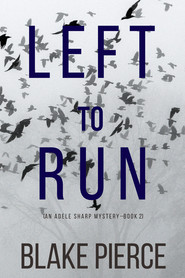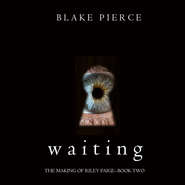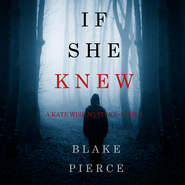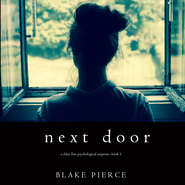По всем вопросам обращайтесь на: info@litportal.ru
(©) 2003-2024.
✖
Cause to Kill
Настройки чтения
Размер шрифта
Высота строк
Поля
She remembered Jack, her ex-husband. Although they hadn’t spoken in a long time, the urge to marry him had been strong when she was younger. He’d offered stability, kindness, love, and support. No matter how intense or aloof Avery had become, he was always there, waiting and eager to give her a hug.
“I guess people commit because they want to feel safe,” she said.
“That’s no reason to commit,” he said. “Gotta be for love.”
Avery had never really understood the concept of love until her daughter Rose was born. As a young college student, she thought she’d loved Jack. The feelings were there and she missed him when he wasn’t around, but if she’d really been in love, she wouldn’t have taken him for granted so much, or left.
She had Rose when she was barely twenty. Jack had wanted to start a family early, but when Rose was born, Avery had felt trapped – no more time alone with Jack, no more time for herself, no more life, career. It had been a mess. She’d been a mess, and it had showed – the end of her marriage, the end of her being a mother. But even though she and Rose were still estranged, she knew, now, she knew.
“What do you know about love?” she asked.
“I know it means I have to make my woman feel good.” He smiled with a sheepish, seductive stare.
“That’s not love,” Avery said. “Love is when you’re willing to give up something you care about for someone else. It’s when you care more about the other person than your own desires, and you act on it – that’s love. It has nothing to do with sex.”
Ramirez raised his brows in respect.
“Whoa,” he said. “That’s deep, Black.”
The memories were painful for Avery to recall. Instead, she tried to stay focused on the task at hand: a killer on the loose and a suspect in custody.
“I gotta go,” she said. “Just wanted to make sure you were going to be all right. All I need is another dead partner on my hands.”
“Go, go,” Ramirez said. “Where’s our Navy Seal?”
“In custody. And you’re actually not that far off. He’s army reserve. Very good with his hands. I already lambasted the dean for withholding information about a possible lethal weapon. Thompson is over at the dorm now.”
“You think he’s our killer?”
“I’m not sure.”
“What’s the hesitation?”
Pieces, she thought. Puzzle pieces that didn’t fit.
“He could be our guy,” she said. “Let’s see what happens.”
CHAPTER ELEVEN
An hour later, Avery stood in a small, dark side chamber with O’Malley and Connelly. Ahead of them, through one-way glass, sat George Fine. His hands were handcuffed to a metal table and he had bandages on his shoulders and legs from the gunshot wounds. He was lucky, Avery realized, that she had just grazed him. Her aim had been true.
Every so often he muttered something under his breath, or twitched. Blank eyes sought out nothing but seemed deep in thought.
In her hand, Avery held a picture that displayed six different black-and-white interpretations of a man’s face, based off the surveillance videos of the killer. Each picture showed a Caucasian perpetrator with a narrow chin, high cheekbones, small eyes, and a high forehead. In three of the photos, the wig, glasses, and moustache had been removed, and the artist had given the killer various hairstyles and facial hair. The last three images maintained at least one aspect of the disguise in case it wasn’t a disguise.
Avery took time to absorb every photo.
The face she’d seen on the cameras was embedded in her mind, and now, with a bunch of clear sketches, she was able to infer other looks: a wider chin, lower cheekbones, a bald head, larger eyes, glasses, and multiple colors for the eyes.
Every so often, she looked up Fine. There were similarities: Caucasian, high cheeks… He seemed to have a leaner frame, but they were both light on their feet. The graceful movements Avery had seen on camera were a lot like the ones she’d observed when George overtook Dan. Still, Avery wasn’t sure. There were the plants and animals. Also, the killer on camera had a fiendishness about him, a spritely humor that was lacking in George. Would George Fine have bowed to a camera?
As if Connelly could mentally hear her doubts, he pointed at the window and said: “This is our guy. I’m sure of it. Look at him. He’s barely said two words since he came here. Can you believe he wants a lawyer? No way. He gets nothing. We need a confession.”
O’Malley had on a dark suit and red tie. He pulled at his lips and frowned and said: “I might have to agree with Connelly on this one. You said you found pictures of Jenkins in his room. He attacked and nearly killed a cop. He also fits the profile. Those sketches are a near match. What’s the hesitation?”
“The pieces don’t all add up,” she said. “Where did he take Cindy after the abduction? How did he learn how to embalm? Randy Johnson said those hairs on Jenkins’ dress were from a cat. Fine doesn’t own a cat. What he does have is a lot of Internet searches for porn and relationship advice. Does that sound like a killer?”
“Listen, Black, this is a courtesy here,” Connelly said with finality. “As far as I’m concerned, this case is over. We got him. He must have a safe house somewhere. That’s where we’ll find the cat and the minivan and the murder weapon. Your job is to find that house. Jeez, why do you always have to act like you’re so much better than everyone else?”
“I just want to get it right.”
“Yeah? Well, that wasn’t always the case, was it?”
A feral energy pulsed from Connelly, cheeks red, eyes bloodshot as if he’d been drinking or had a rough night. He was busting out of his shirt, as usual, and he appeared ready to punch someone in the face.
She addressed O’Malley.
“Let me talk to him.”
“He’s your perp.” O’Malley shrugged. “You can do what you want. But we think this is our guy. We’ve got a lot of people breathing down our necks on this one. Unless you can prove something else, and quick, let’s wrap this up, OK?”
She gave him the thumb’s-up.
“You got it, boss.”
The door to the interrogation room buzzed and Avery pushed through. Everything was gray, including the steel table where the shooter sat, and the mirror and walls.
George blew out a frustrated breath and lowered his head. He wore the same tank top and sweats.
“You remember me?” Avery asked.
“Yeah,” he said, “you’re the bitch that pointed a gun in my face.”
“You tried to kill my partner.”
“Self-defense.” He shrugged. “You busted into my room. Everybody knows Boston PD have itchy trigger-fingers. I was just trying to protect myself.”
“You stabbed him.”
“Talk to my lawyer.”
Avery took a seat.
“Let me see if I can get this straight,” she said. “You’re an economics major. Average student. Army reserve. No criminal record, well, at least not before today. By all accounts, a quiet, harmless student. Only a few friends.” She shrugged. “But I guess that’s what you get when you’re not a hard partier in college. Successful parents. One lawyer. One doctor. No siblings, but,” she noted with emphasis, “a history of hard crushes. Yeah,” she almost apologized, “I talked to the dean and learned all about your crush on Tammy Smith, the girl you followed from Scarsdale? Is she the reason you went to Harvard, or was that just coincidence?”
“I didn’t kill anyone,” he said, and looked her right in the eyes with a determined, unrelenting gaze as if he dared her to say otherwise.
Nothing about the interview felt right to Avery.
“I guess people commit because they want to feel safe,” she said.
“That’s no reason to commit,” he said. “Gotta be for love.”
Avery had never really understood the concept of love until her daughter Rose was born. As a young college student, she thought she’d loved Jack. The feelings were there and she missed him when he wasn’t around, but if she’d really been in love, she wouldn’t have taken him for granted so much, or left.
She had Rose when she was barely twenty. Jack had wanted to start a family early, but when Rose was born, Avery had felt trapped – no more time alone with Jack, no more time for herself, no more life, career. It had been a mess. She’d been a mess, and it had showed – the end of her marriage, the end of her being a mother. But even though she and Rose were still estranged, she knew, now, she knew.
“What do you know about love?” she asked.
“I know it means I have to make my woman feel good.” He smiled with a sheepish, seductive stare.
“That’s not love,” Avery said. “Love is when you’re willing to give up something you care about for someone else. It’s when you care more about the other person than your own desires, and you act on it – that’s love. It has nothing to do with sex.”
Ramirez raised his brows in respect.
“Whoa,” he said. “That’s deep, Black.”
The memories were painful for Avery to recall. Instead, she tried to stay focused on the task at hand: a killer on the loose and a suspect in custody.
“I gotta go,” she said. “Just wanted to make sure you were going to be all right. All I need is another dead partner on my hands.”
“Go, go,” Ramirez said. “Where’s our Navy Seal?”
“In custody. And you’re actually not that far off. He’s army reserve. Very good with his hands. I already lambasted the dean for withholding information about a possible lethal weapon. Thompson is over at the dorm now.”
“You think he’s our killer?”
“I’m not sure.”
“What’s the hesitation?”
Pieces, she thought. Puzzle pieces that didn’t fit.
“He could be our guy,” she said. “Let’s see what happens.”
CHAPTER ELEVEN
An hour later, Avery stood in a small, dark side chamber with O’Malley and Connelly. Ahead of them, through one-way glass, sat George Fine. His hands were handcuffed to a metal table and he had bandages on his shoulders and legs from the gunshot wounds. He was lucky, Avery realized, that she had just grazed him. Her aim had been true.
Every so often he muttered something under his breath, or twitched. Blank eyes sought out nothing but seemed deep in thought.
In her hand, Avery held a picture that displayed six different black-and-white interpretations of a man’s face, based off the surveillance videos of the killer. Each picture showed a Caucasian perpetrator with a narrow chin, high cheekbones, small eyes, and a high forehead. In three of the photos, the wig, glasses, and moustache had been removed, and the artist had given the killer various hairstyles and facial hair. The last three images maintained at least one aspect of the disguise in case it wasn’t a disguise.
Avery took time to absorb every photo.
The face she’d seen on the cameras was embedded in her mind, and now, with a bunch of clear sketches, she was able to infer other looks: a wider chin, lower cheekbones, a bald head, larger eyes, glasses, and multiple colors for the eyes.
Every so often, she looked up Fine. There were similarities: Caucasian, high cheeks… He seemed to have a leaner frame, but they were both light on their feet. The graceful movements Avery had seen on camera were a lot like the ones she’d observed when George overtook Dan. Still, Avery wasn’t sure. There were the plants and animals. Also, the killer on camera had a fiendishness about him, a spritely humor that was lacking in George. Would George Fine have bowed to a camera?
As if Connelly could mentally hear her doubts, he pointed at the window and said: “This is our guy. I’m sure of it. Look at him. He’s barely said two words since he came here. Can you believe he wants a lawyer? No way. He gets nothing. We need a confession.”
O’Malley had on a dark suit and red tie. He pulled at his lips and frowned and said: “I might have to agree with Connelly on this one. You said you found pictures of Jenkins in his room. He attacked and nearly killed a cop. He also fits the profile. Those sketches are a near match. What’s the hesitation?”
“The pieces don’t all add up,” she said. “Where did he take Cindy after the abduction? How did he learn how to embalm? Randy Johnson said those hairs on Jenkins’ dress were from a cat. Fine doesn’t own a cat. What he does have is a lot of Internet searches for porn and relationship advice. Does that sound like a killer?”
“Listen, Black, this is a courtesy here,” Connelly said with finality. “As far as I’m concerned, this case is over. We got him. He must have a safe house somewhere. That’s where we’ll find the cat and the minivan and the murder weapon. Your job is to find that house. Jeez, why do you always have to act like you’re so much better than everyone else?”
“I just want to get it right.”
“Yeah? Well, that wasn’t always the case, was it?”
A feral energy pulsed from Connelly, cheeks red, eyes bloodshot as if he’d been drinking or had a rough night. He was busting out of his shirt, as usual, and he appeared ready to punch someone in the face.
She addressed O’Malley.
“Let me talk to him.”
“He’s your perp.” O’Malley shrugged. “You can do what you want. But we think this is our guy. We’ve got a lot of people breathing down our necks on this one. Unless you can prove something else, and quick, let’s wrap this up, OK?”
She gave him the thumb’s-up.
“You got it, boss.”
The door to the interrogation room buzzed and Avery pushed through. Everything was gray, including the steel table where the shooter sat, and the mirror and walls.
George blew out a frustrated breath and lowered his head. He wore the same tank top and sweats.
“You remember me?” Avery asked.
“Yeah,” he said, “you’re the bitch that pointed a gun in my face.”
“You tried to kill my partner.”
“Self-defense.” He shrugged. “You busted into my room. Everybody knows Boston PD have itchy trigger-fingers. I was just trying to protect myself.”
“You stabbed him.”
“Talk to my lawyer.”
Avery took a seat.
“Let me see if I can get this straight,” she said. “You’re an economics major. Average student. Army reserve. No criminal record, well, at least not before today. By all accounts, a quiet, harmless student. Only a few friends.” She shrugged. “But I guess that’s what you get when you’re not a hard partier in college. Successful parents. One lawyer. One doctor. No siblings, but,” she noted with emphasis, “a history of hard crushes. Yeah,” she almost apologized, “I talked to the dean and learned all about your crush on Tammy Smith, the girl you followed from Scarsdale? Is she the reason you went to Harvard, or was that just coincidence?”
“I didn’t kill anyone,” he said, and looked her right in the eyes with a determined, unrelenting gaze as if he dared her to say otherwise.
Nothing about the interview felt right to Avery.

















